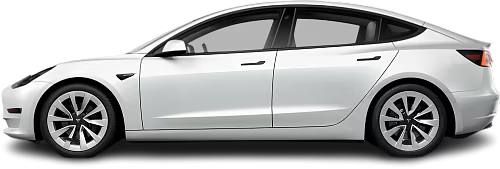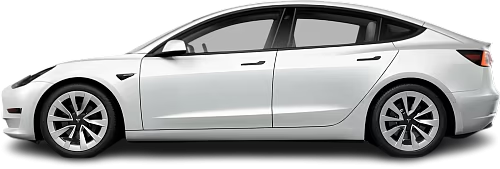Global EV Comparison: Tesla Model 3 Mid Range vs Model 3 Standard Range Plus
Struggling to Decide? Let AI Help!
Your AI Summary Is Ready!
General Info
Since both vehicles have been discontinued, they are now only available on the used car market. You can get the Tesla Model 3 Standard Range Plus (2019-2021) for as low as €21950, while the Tesla Model 3 Mid Range (2018-2020) was never offered for sale in Europe.
The two vehicles share the same body style: Sedan.
| Property | Tesla Model 3 Mid Range | Tesla Model 3 Standard Range Plus |
|---|---|---|
| Years of Production | 2018-2020 | 2019-2021 |
| Current Status | Discontinued | Discontinued |
| Country of Manufacture | USA | China, Germany, USA |
| Body Style | Sedan | Sedan |
| Market Availability | USA | EU, USA |
| Price Europe (Used) | - Price Europe (Used) | €21950 |
| GCC Score | 5.9 | 6.4 |
Range and Efficiency
While the Tesla Model 3 Mid Range (2018-2020) offers a longer real-world range and a bigger battery, it is less energy-efficient than the Tesla Model 3 Standard Range Plus (2019-2021).
| Property | Tesla Model 3 Mid Range | Tesla Model 3 Standard Range Plus |
|---|---|---|
| Range (EPA) | 425 km | 423 km |
| Range (WLTP) | 457 km | 448 km |
| Range (GCC) | 396 km | 393 km |
| Battery Capacity (Nominal) | 65 kWh | 55 kWh |
| Battery Capacity (Usable) | 62 kWh | 52.5 kWh |
| Efficiency per 100 km | 15.7 kWh/100 km | 13.4 kWh/100 km |
| Efficiency per kWh | 6.39 km/kWh | 7.49 km/kWh |
| Range and Efficiency Score | 7.4 | 8.1 |
Charging
Both vehicles utilize a standard 400-volt architecture.
The Tesla Model 3 Mid Range (2018-2020) offers faster charging speeds at DC stations, reaching up to 200 kW, while the Tesla Model 3 Standard Range Plus (2019-2021) maxes out at 170 kW.
The Tesla Model 3 Standard Range Plus (2019-2021) features a more powerful on-board charger, supporting a maximum AC charging power of 11 kW, whereas the Tesla Model 3 Mid Range (2018-2020) is limited to 7.7 kW.
| Property | Tesla Model 3 Mid Range | Tesla Model 3 Standard Range Plus |
|---|---|---|
| Max Charging Power (AC) | 7.7 kW | 11 kW |
| Max Charging Power (DC) | 200 kW | 170 kW |
| Architecture | 400 V | 400 V |
| Charge Port | Tesla (NACS) | CCS Type 2 (Tesla) |
| Charging Score | 5.5 | 5.6 |
Performance
Both vehicles are rear-wheel drive.
Although the Tesla Model 3 Standard Range Plus (2019-2021) has more power, the Tesla Model 3 Mid Range (2018-2020) achieves a faster 0-100 km/h time.
| Property | Tesla Model 3 Mid Range | Tesla Model 3 Standard Range Plus |
|---|---|---|
| Drive Type | RWD | RWD |
| Motor Type | PMSM | PMSM |
| Motor Power (kW) | 202 kW | 239 kW |
| Motor Power (hp) | 271 hp | 320 hp |
| Motor Torque | 404 Nm | 420 Nm |
| 0-100 km/h | 5.5 s | 5.6 s |
| Top Speed | 225 km/h | 225 km/h |
| Performance Score | 5 | 5.2 |
Dimensions
The Tesla Model 3 Mid Range (2018-2020) and Tesla Model 3 Standard Range Plus (2019-2021) are about the same size.
Both models have similar wheelbase lengths.
| Property | Tesla Model 3 Mid Range | Tesla Model 3 Standard Range Plus |
|---|---|---|
| Length | 4695 mm | 4695 mm |
| Width (with Mirrors) | 2088 mm | 2088 mm |
| Width (w/o Mirrors) | 1850 mm | 1850 mm |
| Height | 1445 mm | 1445 mm |
| Wheelbase | 2875 mm | 2875 mm |
Cargo and Towing
Both models provide equal trunk space and the same total cargo volume when the rear seats are folded.
Both models feature a convenient frunk (front trunk), providing additional storage space.
The Tesla Model 3 Standard Range Plus (2019-2021) is better suited for heavy loads, offering a greater towing capacity than the Tesla Model 3 Mid Range (2018-2020).
| Property | Tesla Model 3 Mid Range | Tesla Model 3 Standard Range Plus |
|---|---|---|
| Number of Seats | 5 | 5 |
| Curb Weight | 1672 kg | 1645 kg |
| Cargo Volume (Trunk) | 561 l | 561 l |
| Cargo Volume (Max) | 1235 l | 1235 l |
| Cargo Volume (Frunk) | 88 l | 88 l |
| Towing Capacity | 910 kg | 1000 kg |
| Cargo and Towing Score | 5.1 | 5.1 |




